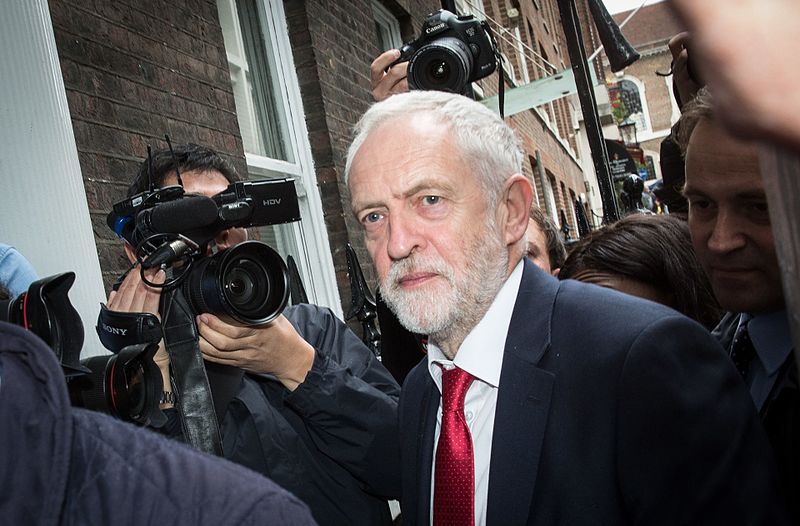The crisis that began in 2008 exposed capitalism. It started a process in which millions of young people and workers began to challenge, not just so-called ‘neoliberalism’, but capitalism itself. Yet this crisis of capitalism, rather than propelling the left to power, has pushed the left into crisis. Superficially, this is a contradiction, but if we look beyond the surface, we see it flows from the limitations of reformist politics in a period such as the one we are living through.
What is reformism? Reformism is first and foremost defined by its opposition to a fundamental break with capitalism. Instead, it suggests that, in one way or another, the problems of the working class can be solved by introducing a series of reforms to the system. Revolution is rendered unnecessary.
As Marxists, we are not opposed to reforms but these cannot in themselves achieve the necessary transfer of power from the capitalist class to the working class. The economy will remain in the hands of the capitalists and they will attempt to sabotage such reforms, particularly in a time such as the present when they can ill afford any cuts to their profit margins.
The world market and the capitalist economy do not allow themselves to be subdued by laws and regulations. The programmes of the reformists therefore, which promise a lot of nice things, cannot be carried out under capitalism. This is a key dividing line between Marxism and the various shades of reformism.
A disdain for theory
120 years ago, Rosa Luxemburg, in her debates with the revisionist Eduard Bernstein, noted that one common thread between the latter and his reformist co-thinkers in the German Social Democracy was their disdain for theory:
“What appears to characterise this practice above all? A certain hostility to ‘theory’. This is quite natural, for our ‘theory,’ that is, the principles of scientific socialism, impose clearly marked limitations to practical activity… It is quite natural for people who run after immediate ‘practical’ results to want to free themselves from such limitations and to render their practice independent of our ‘theory’.” (Reform or Revolution?)
 A common feature of reformism is its distain for theory / Image: public domain
A common feature of reformism is its distain for theory / Image: public domain
In the case of Germany, at the time, the ‘practical’ social democratic deputies wanted to vote for liberal budgets. However, Marxist theory formed an obstacle to such actions. This theory, far from being something plucked from thin air, comes from studying the history of the working-class movement. Marxists have drawn certain conclusions based on the experience of the struggles of the working class.
From the Paris Commune of 1871, Marx and Engels drew the conclusion that the working class cannot seize the ready-made state machinery and use it for their own purposes. Workers cannot take over the bourgeois state and use it to create socialism. Marx and Engles noted that when the workers of Paris seized power, they established their own state out of necessity. This lesson has been confirmed on many occasions since but this hasn’t stopped the reformists from attempting to leave the capitalist state intact, often with disastrous results.
“The question of the nature of the state before and after the conquest of power is one of the decisive criterions which separates Marxism from all other tendencies in the Labour movement.” (Trotsky)
The advantage of theory (and where it becomes an obstacle for reformists) is in its ability to guide us against making the same mistake over and over again. But reformists do not want to hear anything about the lessons of struggles in years gone by because this places clear limits on their political activity.
In general, the whole outlook of reformism is based on seeking shortcuts. Reformists only wish to set themselves tasks that can be achieved quickly and within capitalism. Socialism, therefore, is left to the future. They try to find various types of reform that the capitalists in one way or another can accept. This attempts to force the class struggle into the realm of what is affordable to capitalism. Yet, the whole point is that capitalism cannot afford to give workers a decent living standard, particularly in this period.
The reformist solution might seem like the easy way out. Most workers, as practical people, will try the easy route before the hard one. This is what the reformists base themselves on: the fact that there are layers of the working class that haven’t yet grasped the need to change society. Rather than trying to raise the level of consciousness of the class, they try to sell easy solutions. In the end, it is the workers who pay the price.
Marxists have a different approach. We say what is. When something cannot be achieved under capitalism, we say so. As Marx and Engels explained in the Communist Manifesto:
“The Communists disdain to conceal their views and aims. They openly declare that their ends can be attained only by the forcible overthrow of all existing social conditions.”
Precisely this last point is what reformists do not wish to admit. From the first step of saying that socialist revolution is impossible or unnecessary, the logical next step is to say that the socialist revolution is undesirable. In the eyes of the philistine reformists, revolution is equated with violence, disruption and destruction. Much better to leave it to the leadership, as they see it, who will safely navigate us through the choppy waters of the crisis. From failure to understand the causes of revolution, reformists find themselves in complete opposition to revolutions when they actually occur. This is also the case when they have been brought to power on the back of such revolutions.
These so-called leaders try to ride the wave, holding the movement back as best as they can, waiting for calmer, ‘normal’, times when politics are the exclusive property of the professional politicians and commentators.
Saving capitalism from itself
There is a trend among reformists to imagine that the state can solve the problems of the capitalist system. It’s not surprising then that Keynesianism is their economic doctrine of choice. The whole point of Keynesianism however was precisely that it was about preventing socialism. If you read Keynes’ writings, you’ll find precisely this idea in black and white (see, for example, his Economic Consequences of the Peace).
This is precisely what the efforts of the reformists end up resolving themselves into. In the words of Yanis Varoufakis, the former finance minister of the Syriza government in Greece:
“[It] is the Left’s historical duty, at this particular juncture, to stabilise capitalism; to save European capitalism from itself and from the inane handlers of the Eurozone’s inevitable crisis.” (Confessions of an erratic Marxist)
The argument is essentially that the bourgeois politicians are bad managers of capitalism but the reformists, and even better the left reformists, are good managers of capitalism. These reformists claim to understand how to balance between the workers’ demands and the capitalists’ demands, and so how to improve society for both capitalists and workers.
From the impossibility of a revolution in Greece, Varoufakis draws the conclusion that it must be his role to save capitalism. His arguments are very similar to those of Bernstein at the end of the 19th century.
The Achilles' heel of Corbynism
Corbyn, as a very left-wing Labour politician, came to power on the back of a process of mass radicalisation of the working class after years of austerity. Nevertheless, Corbyn was no Marxist and he was not a revolutionary. When he came to power, being a very nice and friendly individual, despite how the media have portrayed him, he continually tried to appease the right wing of the party. This was a fatal mistake.
In fact, time and time again we have seen the left reformists dragged in the wake of the right reformists, who in turn chase after the liberals and the conservatives, i.e. the bosses’ parties. And so you have this constant stream of politics toward the right, which we see confirmed in various countries at the moment.
 Corbyn tried to accomodate the right wing, with fatal results / Image: Momentum, Flickr
Corbyn tried to accomodate the right wing, with fatal results / Image: Momentum, Flickr
The failure of the left leadership was in not understanding that the right fundamentally represents the interests of the ruling class inside the Labour Party, and that the ruling class had no interest whatsoever in allowing Corbyn to become Prime Minister. As such, the right wing of the party was adamantly opposed to Corbyn becoming Prime Minister also.
Corbyn was incapable of dealing with this situation. He and his allies were not prepared to fight to the end against the right of the party. He came under huge pressure and, it must be said, withstood that pressure far better than many other leaders. But in the end, after four years as leader of the party, he did not deal a decisive blow against the right, despite having the overwhelming support of the membership and the trade union rank-and-file.
This is very different to the behaviour of Labour’s right today. They feel very confident because they have behind them the whole ruling class, and they know it. Despite the ferociousness of the attack, some on the left of Labour persist in trying to find an agreement with Keir Starmer, and continue to appeal to him for “unity”.
Similar political problems were posed to the Corbyn movement when it came to dealing with the capitalist class and the capitalist economy. The 2017 Labour manifesto was very good in a lot of ways. It raised demands for a lot of reforms and even the question of nationalisation and workers’ control were posed, albeit in quite a mild manner.
However, John McDonnell, who at that time was Shadow Chancellor, would go on to television and refer to the capitalist class as “wealth creators”! In Britain, of all places, the capitalists are among the most parasitic in the world. He made these statements despite on other occasions calling himself a ‘Marxist’. Even the most basic reading of Marx allows you to understand that it is the workers that are the wealth creators.
So in one moment, it’s that capitalist that are wealth creators, in the next, it’s the workers. In the case of John McDonnell, this apparent confusion is a deliberate tactic to try and appease everyone. But far from disarming the right wing, such a tactic could only politically disarm and confuse the Corbyn movement itself.
In the end, it was an attempt to politically compromise with the right over the question of the European Union that unravelled the movement. Corbyn had, correctly, opposed the European Union as a bosses’ club for many years. But in the first months of his leadership he made what must have seemed like a small compromise – not challenging the Labour Party’s support for staying in the European Union. But that apparently small mistake, made in the first month of his leadership to avoid a clash over this question, had disastrous consequences.
The electorate did not vote the way that the Labour leadership, and the establishment, imagined they would. In the end, Brexit became the Achilles’ heel of the whole of the Corbyn movement, resulting in a whole section of the left of the Labour Party taking up a pro-EU position, partly, or to a large extent because of the position that Corbyn had taken. After the referendum result, this allowed the right to seize upon this point to launch numerous attacks on Corbyn on the basis of a pro-EU stance. This even reached the point where the main campaign for a second referendum was launched by those on the left of the party, who unwittingly did a lot of damage to Corbyn’s leadership.
The main campaign for a second referendum in Britain two years ago was funded directly by the capitalists, but was employing Corbynistas! This was a deliberate wedge driven into the Corbyn movement in order to divide it, with right wingers like Tony Blair and Alastair Campbell at the forefront.
From Syriza to Sanders
Other phenomena that we’ve seen on the left have encountered similar obstacles. We can take Bernie Sanders, for example, who attempted to win over the Democratic Party. Yet, experience proved precisely why this was never going to work.
In his campaign, Sanders constantly made overtures to the Democratic Party establishment. He played by the rules, which were in turn completely rigged against him.
Where those rules were insufficient to stop him, then the Democratic Party establishment simply made up new rules as they went along. Faced with this opposition, Bernie Sanders simply capitulated under the excuse of ‘lesser-evilism’ and supported first Hillary Clinton, and now Joe Biden. This despite the fact that Clinton and Biden do not represent the working class in any shape or form: they are conscious agents of the capitalist class.
 SYRIZA capitulated to the pressure of the Troika, thoroughly discrediting themselves / Image: Пресс служба Президента России
SYRIZA capitulated to the pressure of the Troika, thoroughly discrediting themselves / Image: Пресс служба Президента России
This is obvious to a growing layer of Americans. As such, Sanders’ efforts have fallen flat on their face, and his movement – and all the enthusiasm it generated – simply collapsed. There’s clearly no way through the morass of the Democratic Party.
We’ve already mentioned the ideas of Varoufakis. When Syriza first came to power he was seen as on the left of that government. When the government was presented with memoranda by the troika of the European Commission, the ECB and the IMF, which demanded austerity in Greece, Varoufakis preferred to resign than put his name to the new measures. But his whole outlook was not so dissimilar from that of the other leaders who supported the memoranda.
Like Tsipras, he believed they could enter into negotiations and get a better deal than they already had. They believed that the previous government had been bad negotiators and that was why German capitalism had applied such punitive austerity on Greece. By being a bit more forceful in negotiating, they imagined they could secure a better deal for the Greek people. This was proven to be completely false.
The Syriza leadership completely underestimated the intransigence and hostility of the capitalist class. They made lots of overtures to the capitalists, promising to make sure everyone got their money back, and all the debts were repaid. But herein lay the problem. The super-rich are able to avoid taxes entirely so either the workers and the poor of Greece must pay through austerity, or the capitalists and creditors would lose out. So, promising that the government would respect capitalist property implicitly meant accepting that the workers would pay in the end.
Neither their overtures nor their negotiating strategy had any impact. They attempted to put pressure on the EU by organising a referendum. The Greek masses registered a massive “No” vote, but the European Union didn’t flinch. Rather, when Tsipras came back to the negotiating table he was offered an even worse deal.
Why? The capitalists felt they needed to punish Tsipras for attempting to mobilise the masses against the European Union. It would set a very bad precedent if the working class had been allowed any say over the memoranda. The European Union was not going to permit the Greek, Spanish, or Italian working classes a place at the negotiating table.
And so Syriza capitulated. Such a position flowed naturally from the reformist perspective that there is no alternative to capitalism. If you accept the capitalist system, you accept that debts must be repaid. You therefore have to accept capitalist cuts, capitalist austerity, and everything else that flows from this fact. It took only a few months of a Syriza government for this reality to assert itself.
Podemos and the national question
In Spain, we have the example of Podemos, or as it is known after its merger, Unidas Podemos. It started off making very radical noises and, at times, it moved quite far to the left. But when the prospect of taking part in government opened up, the leaders very quickly shifted to the right and attempted to present themselves with a ‘respectable’ image on various questions.
A crucial question was that of Catalan self-determination. After having openly defended the right of self-determination, and thus gained mass support as a result in Catalonia and the Basque country, the leaders of Podemos abandoned the demand in practice at the time of the Catalan independence referendum in 2017, de facto siding with the Spanish 1978 regime they had railed against earlier. The Socialist Party, for its part, arrived at its own ‘compromise’ with the reactionary Spanish ruling class in the 1970s, part of which involved accepting the unconditional unity of Spain.
In general, the national question is a big weakness of reformists. When put to the test, they prove completely incapable of understanding the difference between the national aspirations of the likes of Scotland or Catalonia and the reactionary nationalism of British or Spanish capitalism. In fact, the leaders of the Scottish Labour left insist it’s the same thing. They see nationalism rising in Scotland and England and equate the two. The right of the Scottish people to self-determination is put on the same plane as the reactionary programme of Boris Johnson and the Brexiteers.
The crisis of reformism
It is the political and theoretical weakness of the left leaders that make the left parties completely unable to face the crisis of capitalism. Rather than thriving in a mass questioning of the system, reformism is like a fish out of water. The two phenomena are intimately linked. Trotsky explained this long ago:
“Viewed historically reformism has lost completely its social hosts. Without reforms there is no reformism, without prosperous capitalism, no reform.”
In Greece, PASOK was completely destroyed by its support for the memoranda. The party hardly exists now. Syriza hasn’t been as cruelly punished but its support has shrunk massively. You can see the process at work in the French Socialist Party, which has faced a similar fate as a result of doing the dirty work of the capitalist class.
The left reformists don’t actually have anything fundamentally different to offer either. They essentially offer a slightly left-wing version of the same programme as the right reformists, often covered up with a few more left-wing or even Marxist-sounding phrases. Without being able to deliver any reforms, however, reformism in all its flavours does not make sense. Nevertheless, workers will try these parties again and again, and find them wanting.
Marxists have always argued, and will continue to argue in the labour movement for a revolutionary class standpoint. For decades, we have fought in the Labour Party for Marxist ideas. It is not a way to make friends but it remains our duty to explain clearly that on the road of reformism lies only defeat and ruin, whilst defending every concrete step forward taken by the movement. Through practical experience, workers and youth are drawing the same conclusions. It is on this road that humanity will have to travel: the road to the socialist transformation of society.

